Horse Hay Feeders are an essential part of equine management. They play a crucial role in minimizing hay waste, promoting healthy eating habits, and ensuring your horse receives adequate nutrition. Selecting the right feeder can significantly impact your horse’s well-being and save you money in the long run.
Types of Horse Hay Feeders: Finding the Perfect Fit
There’s a wide variety of horse hay feeders available, each designed with specific benefits in mind. Choosing the best one for your horse depends on several factors, including their age, feeding habits, living environment (stall or pasture), and your budget. Let’s explore some popular options:
Slow Feed Hay Nets: Reducing Boredom and Waste
 Slow Feed Hay Net for Horses in a Stall
Slow Feed Hay Net for Horses in a Stall
Slow feed hay nets are excellent for mimicking natural grazing behavior. These nets have small openings that force horses to eat more slowly, reducing boredom and preventing digestive issues. They’re particularly beneficial for horses prone to overeating or those on restricted diets.
Hay Feeders for Stalls: Maximizing Space and Efficiency
horse hay feeders for stalls are designed to optimize space within a stall while keeping hay clean and off the ground. Options range from wall-mounted feeders to free-standing models, catering to different stall configurations and horse preferences.
Plastic Horse Hay Feeders: Durability and Ease of Cleaning
plastic horse hay feeder are a popular choice due to their durability, ease of cleaning, and affordability. They’re resistant to rust and damage, making them a practical option for both indoor and outdoor use.
Field Hay Feeders: Managing Feeding in Pastures
horse hay feeders field are specifically designed for pasture use. These robust feeders can withstand the elements and help minimize hay waste in outdoor environments. They’re often larger than stall feeders to accommodate multiple horses.
Benefits of Using Horse Hay Feeders
Investing in quality horse hay feeders offers a multitude of advantages:
- Reduced Hay Waste: By containing the hay, feeders minimize trampling and soilage, saving you money on hay costs.
- Improved Digestive Health: Slow feeders promote slower eating, which can help prevent colic and other digestive problems.
- Reduced Boredom: Slow feeders keep horses occupied for longer periods, reducing boredom and potentially preventing stable vices.
- Cleaner Environment: Keeping hay off the ground results in a cleaner stall or pasture, reducing the risk of respiratory issues and infections.
What are the different types of horse hay feeders?
Common types include slow feed nets, hay feeders for stalls, plastic horse hay feeders, and field hay feeders.
Dr. Emily Carter, an equine nutritionist, emphasizes, “Using appropriate horse hay feeders isn’t just about convenience; it’s a crucial part of responsible horse ownership, ensuring optimal equine health and well-being.”
Choosing the Right Size and Material
The size of your horse hay feeder should correspond to the size of your horse and the amount of hay they consume. Smaller ponies will require smaller feeders, while larger draft horses will need larger capacity options. Materials range from durable plastic and metal to natural wood.
What size hay feeder do I need?
The ideal size depends on your horse’s size and how much hay they consume. Consider factors such as breed, age, and activity level.
Maintaining Your Horse Hay Feeders
Regular cleaning and maintenance are essential for ensuring the longevity and hygiene of your horse hay feeders. Remove any leftover hay regularly and disinfect the feeder periodically to prevent mold and bacterial growth.
How do I clean a horse hay feeder?
Regularly remove leftover hay and disinfect the feeder with a suitable cleaning solution to prevent mold and bacterial growth.
mini horse hay feeders are specifically designed for miniature horses and ponies, ensuring they can access their hay comfortably and safely.
corner hay feeders for horses can be a space-saving solution for stalls, maximizing available floor space while providing easy access to hay.
John Miller, a seasoned horse trainer, shares, “Investing in a well-designed hay feeder has transformed how my horses eat. They’re calmer, waste less hay, and their overall health has improved significantly.”
Conclusion
Choosing the right horse hay feeders is a crucial aspect of horse care. By considering your horse’s specific needs and investing in a quality feeder, you can contribute to their overall health, well-being, and happiness. A good horse hay feeder is an investment that pays off in reduced waste, improved health, and a happier horse.
For any assistance or further information, please contact us at Phone Number: 0772127271, Email: [email protected], or visit our location at QGM2+WX2, Vị Trung, Vị Thuỷ, Hậu Giang, Việt Nam. We have a 24/7 customer support team.